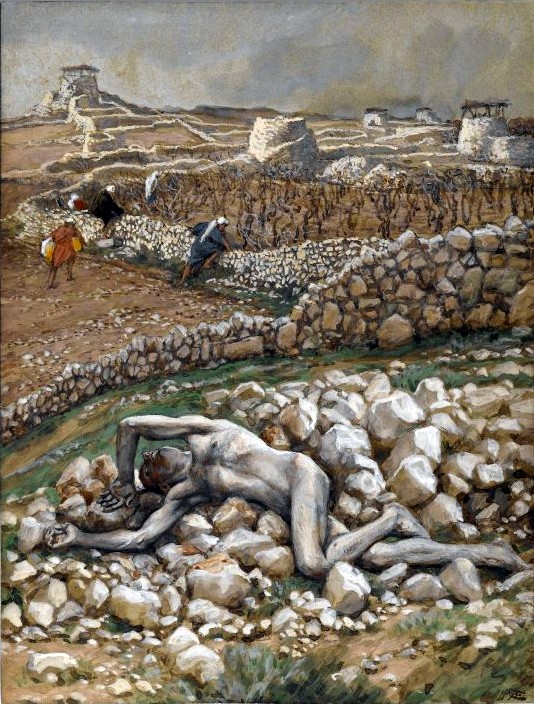My dear friends,
In Mark 11:27-12:17, we find Jesus confronted by a series of challenges that not only test his authority and wisdom but also offer profound insights into the nature of spiritual leadership and the essence of compassionate action. Let's consider the motivations behind the questions posed to Jesus and how his responses embody the Buddhist principle of "skillful means" (upaya-kaushalya), a method of guiding others towards enlightenment through contextually appropriate actions and teachings.

The Son of the Vineyard
James Tissot, ca. 1890
As he was walking in the temple,
the chief priests, the scribes, and the elders
came to him and said,
‘By what authority are you doing these things?
Who gave you this authority to do them?’
Jesus said to them, ‘I will ask you one question;
answer me, and I will tell you
by what authority I do these things.
Did the baptism of John come from heaven,
or was it of human origin? Answer me.’
They argued with one another,
‘If we say, “From heaven”,
he will say, “Why then did you not believe him?”
But shall we say, “Of human origin”?’
— they were afraid of the crowd,
for all regarded John as truly a prophet.
So they answered Jesus, ‘We do not know.’
And Jesus said to them, ‘Neither will I tell you
by what authority I am doing these things.’
- Mark 11:27-33
The elders, scribes, and Pharisees' inquiry into Jesus's authority reveals their deep-seated insecurity and fear of losing control over the spiritual direction of the people. Jesus's refusal to answer directly, instead posing a question about John the Baptist, illustrates the use of "skillful means." This approach not only avoids confrontation but also turns the question back on the questioners, encouraging them to reflect on their own beliefs and motivations.
‘A man planted a vineyard, put a fence around it,
dug a pit for the wine press, and built a watch-tower;
then he leased it to tenants and went to another country.
When the season came, he sent a slave to the tenants
to collect from them his share of the produce of the vineyard.
But they seized him, and beat him, and sent him away empty-handed.
And again he sent another slave to them; this one they beat over the head and insulted.
Then he sent another, and that one they killed.
And so it was with many others; some they beat, and others they killed.
He had still one other, a beloved son.
Finally he sent him to them, saying, “They will respect my son.”
But those tenants said to one another,
“This is the heir; come, let us kill him, and the inheritance will be ours.”
So they seized him, killed him, and threw him out of the vineyard.
What then will the owner of the vineyard do?
He will come and destroy the tenants and give the vineyard to others."
- Mark 12:1-9
The parable of the vineyard serves as a metaphor for the rejection of prophets sent by God, culminating in the murder of his son, symbolizing Jesus. Here, Jesus employs "skillful means" by using a story that resonates with the cultural and religious context of his audience. This method not only communicates deep spiritual truths but also indirectly addresses the leaders' intentions to harm him, highlighting their misguided actions while calling for introspection.
“The stone that the builders rejected has become the cornerstone;
this was the Lord’s doing, and it is amazing in our eyes”?’
When they realized that he had told this parable against them,
they wanted to arrest him, but they feared the crowd.
So they left him and went away.
- Mark 12:10-12
In quoting scripture about the rejected stone becoming the cornerstone, Jesus subtly reveals his identity and mission, further demonstrating "skillful means." This statement not only confounds his adversaries but also reinforces his authority through the fulfillment of prophecy, encouraging all to reconsider their perceptions and the very foundations of their faith.
to trap him in what he said.
And they came and said to him,
‘Teacher, we know that you are sincere, and show deference to no one;
for you do not regard people with partiality, but teach the way of God in accordance with truth.
Is it lawful to pay taxes to the emperor, or not?
Should we pay them, or should we not?’
But knowing their hypocrisy, he said to them, ‘Why are you putting me to the test?
Bring me a denarius and let me see it.’
And they brought one.
Then he said to them, ‘Whose head is this, and whose title?’
They answered, ‘The emperor’s.’
Jesus said to them,
‘Give to the emperor the things that are the emperor’s, and to God the things that are God’s.’
And they were utterly amazed at him.
- Mark 12:13-17
The Pharisees and Herodians' attempt to entrap Jesus with the question of taxes showcases their manipulation and hypocrisy. Jesus's response, "Give to the emperor the things that are the emperor’s, and to God the things that are God’s," is a masterful example of "skillful means." By transcending the duality of the question, Jesus avoids political entanglement, focuses on the higher spiritual principle, and demonstrates a path of wisdom that navigates worldly and divine obligations with discernment.
The interactions between Jesus and the religious leaders in Mark 11:27-12:17 offer a compelling study in the use of "skillful means." Through parables, rhetoric, and prophetic fulfillment, Jesus not only navigates the challenges posed by his questioners but also guides them (and us) towards deeper spiritual understanding and reflection. His teachings transcend mere religious authority, inviting all into a journey of transformation that reconciles earthly and heavenly realms.